Report on Inclusive Practices: Personal Experiences and Strategies
VerifiedAdded on 2022/11/25
|9
|1627
|458
Report
AI Summary
This report provides a comprehensive overview of inclusive practices in education, emphasizing the creation of welcoming and safe classroom environments that value individual differences. The report explores the impact of personal, social, and cultural factors on learning, including age, gender, peer pressure, and educational background. It also examines the influence of cognitive, sensory, and physical abilities on learners, such as reading abilities, physical disabilities, and visual or hearing impairments. Furthermore, the report delves into relevant policy and regulatory frameworks, specifically the Equality Act 2010, and provides examples from personal teaching experiences and organizational policies. Task 2 focuses on the author's role and responsibilities, including teaching methods, material preparation, and collaboration with other professionals, while also identifying points of referral for student support. The report reviews the merits of inclusive learning practices, proposes strategies for effective collaboration between professionals, and concludes with an action plan for enhancing creativity, collaboration, intuition, and organizational skills to promote inclusive education. References to books and journals support the research.
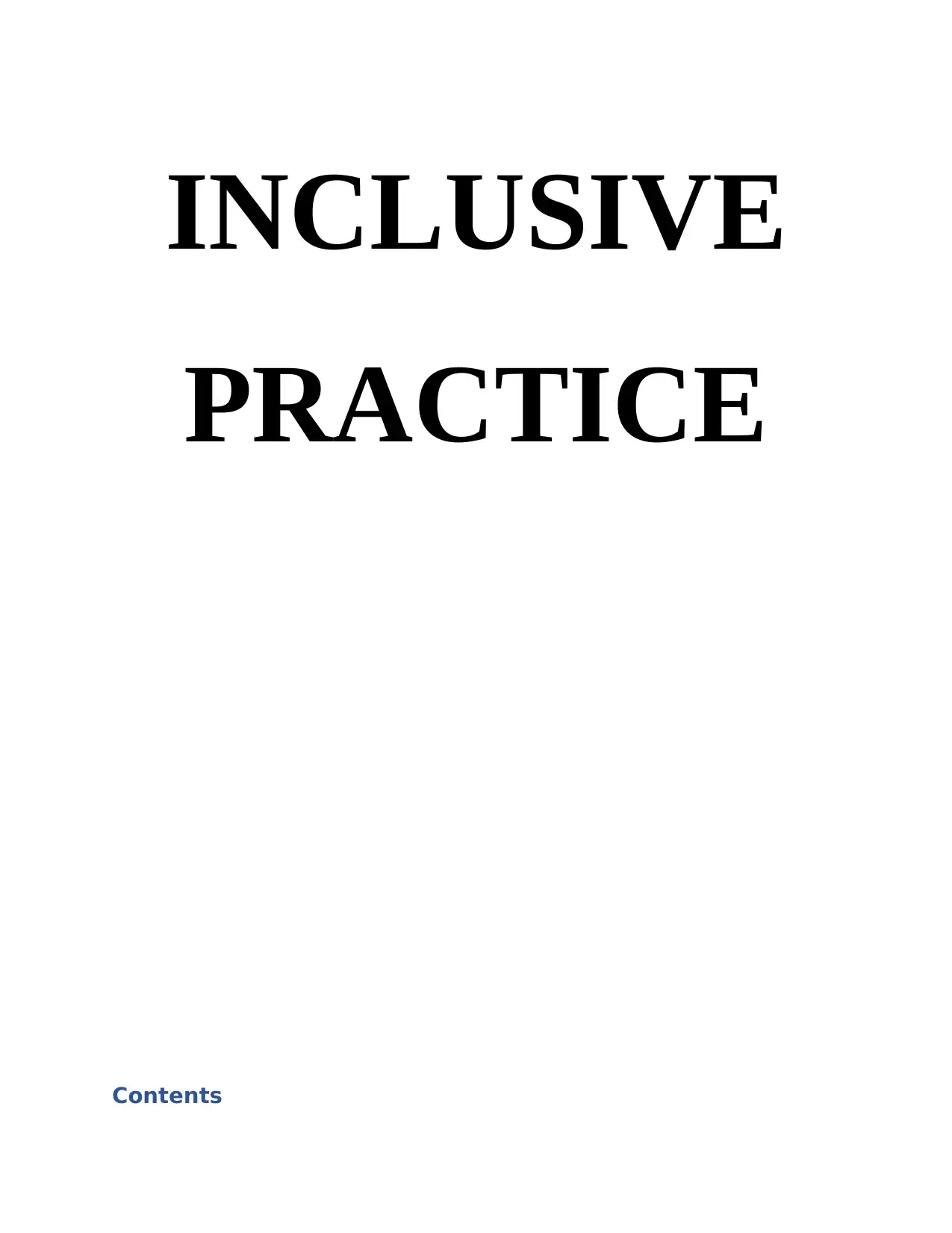
INCLUSIVE
PRACTICE
Contents
PRACTICE
Contents
Paraphrase This Document
Need a fresh take? Get an instant paraphrase of this document with our AI Paraphraser
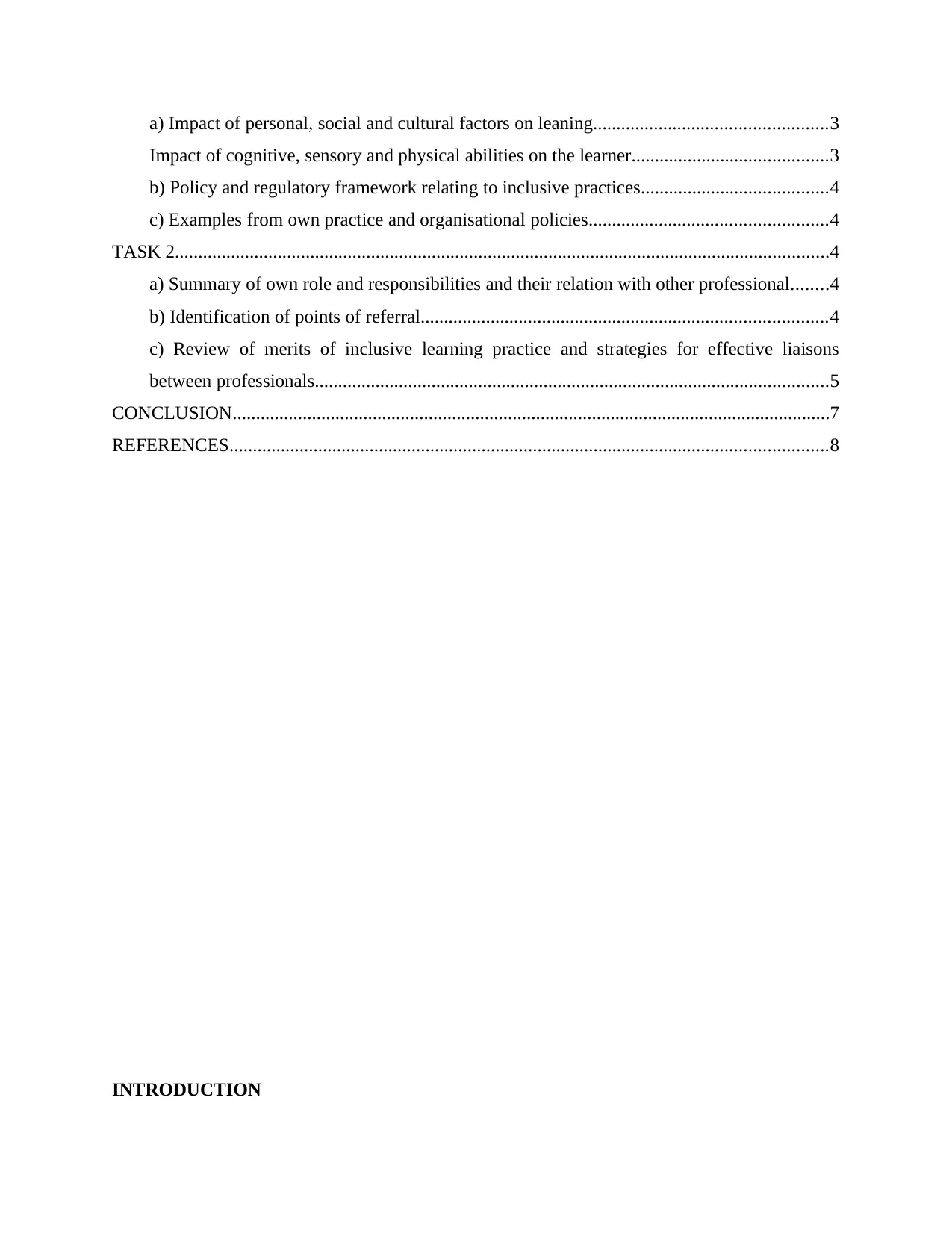
a) Impact of personal, social and cultural factors on leaning..................................................3
Impact of cognitive, sensory and physical abilities on the learner..........................................3
b) Policy and regulatory framework relating to inclusive practices........................................4
c) Examples from own practice and organisational policies...................................................4
TASK 2............................................................................................................................................4
a) Summary of own role and responsibilities and their relation with other professional........4
b) Identification of points of referral.......................................................................................4
c) Review of merits of inclusive learning practice and strategies for effective liaisons
between professionals..............................................................................................................5
CONCLUSION................................................................................................................................7
REFERENCES................................................................................................................................8
INTRODUCTION
Impact of cognitive, sensory and physical abilities on the learner..........................................3
b) Policy and regulatory framework relating to inclusive practices........................................4
c) Examples from own practice and organisational policies...................................................4
TASK 2............................................................................................................................................4
a) Summary of own role and responsibilities and their relation with other professional........4
b) Identification of points of referral.......................................................................................4
c) Review of merits of inclusive learning practice and strategies for effective liaisons
between professionals..............................................................................................................5
CONCLUSION................................................................................................................................7
REFERENCES................................................................................................................................8
INTRODUCTION
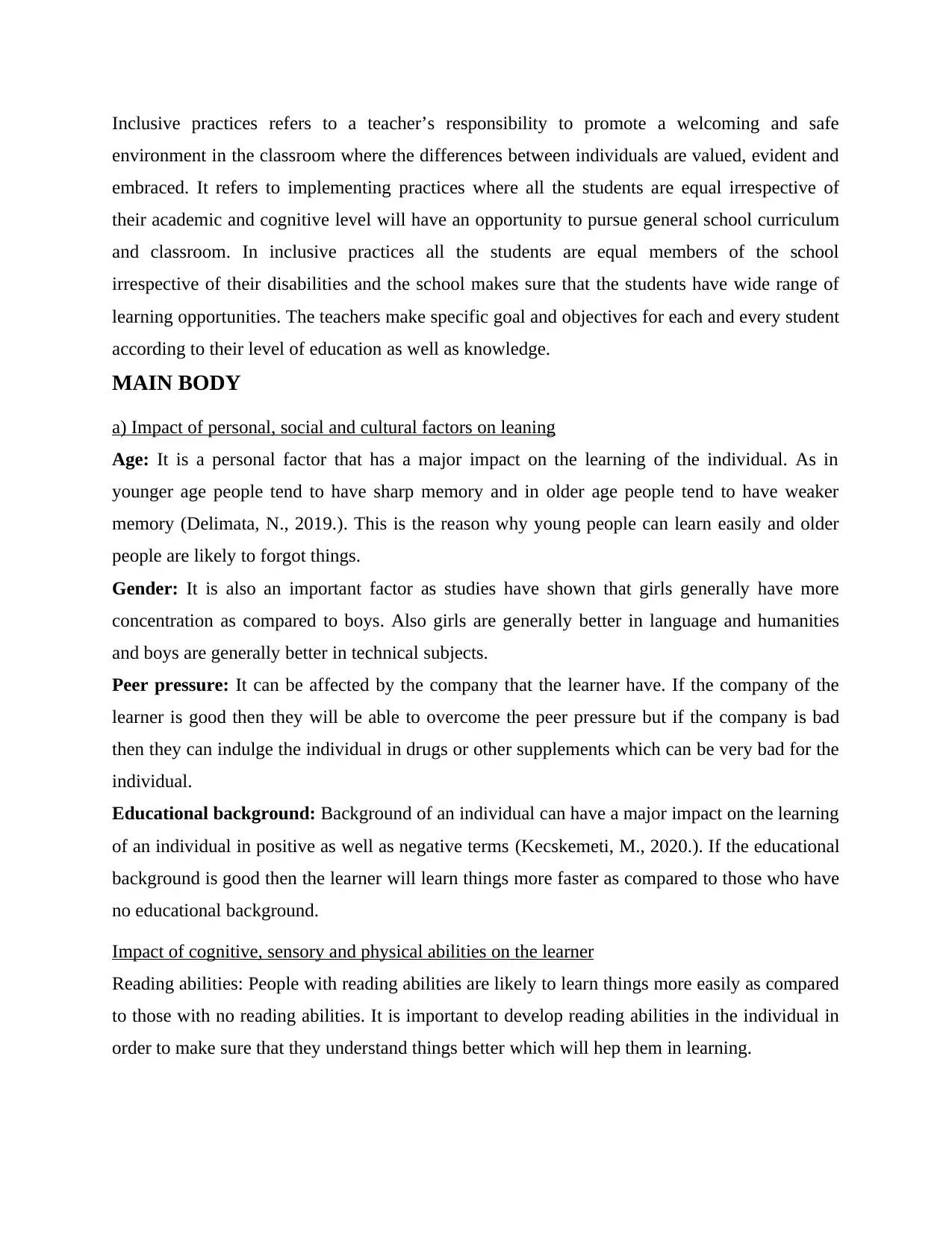
Inclusive practices refers to a teacher’s responsibility to promote a welcoming and safe
environment in the classroom where the differences between individuals are valued, evident and
embraced. It refers to implementing practices where all the students are equal irrespective of
their academic and cognitive level will have an opportunity to pursue general school curriculum
and classroom. In inclusive practices all the students are equal members of the school
irrespective of their disabilities and the school makes sure that the students have wide range of
learning opportunities. The teachers make specific goal and objectives for each and every student
according to their level of education as well as knowledge.
MAIN BODY
a) Impact of personal, social and cultural factors on leaning
Age: It is a personal factor that has a major impact on the learning of the individual. As in
younger age people tend to have sharp memory and in older age people tend to have weaker
memory (Delimata, N., 2019.). This is the reason why young people can learn easily and older
people are likely to forgot things.
Gender: It is also an important factor as studies have shown that girls generally have more
concentration as compared to boys. Also girls are generally better in language and humanities
and boys are generally better in technical subjects.
Peer pressure: It can be affected by the company that the learner have. If the company of the
learner is good then they will be able to overcome the peer pressure but if the company is bad
then they can indulge the individual in drugs or other supplements which can be very bad for the
individual.
Educational background: Background of an individual can have a major impact on the learning
of an individual in positive as well as negative terms (Kecskemeti, M., 2020.). If the educational
background is good then the learner will learn things more faster as compared to those who have
no educational background.
Impact of cognitive, sensory and physical abilities on the learner
Reading abilities: People with reading abilities are likely to learn things more easily as compared
to those with no reading abilities. It is important to develop reading abilities in the individual in
order to make sure that they understand things better which will hep them in learning.
environment in the classroom where the differences between individuals are valued, evident and
embraced. It refers to implementing practices where all the students are equal irrespective of
their academic and cognitive level will have an opportunity to pursue general school curriculum
and classroom. In inclusive practices all the students are equal members of the school
irrespective of their disabilities and the school makes sure that the students have wide range of
learning opportunities. The teachers make specific goal and objectives for each and every student
according to their level of education as well as knowledge.
MAIN BODY
a) Impact of personal, social and cultural factors on leaning
Age: It is a personal factor that has a major impact on the learning of the individual. As in
younger age people tend to have sharp memory and in older age people tend to have weaker
memory (Delimata, N., 2019.). This is the reason why young people can learn easily and older
people are likely to forgot things.
Gender: It is also an important factor as studies have shown that girls generally have more
concentration as compared to boys. Also girls are generally better in language and humanities
and boys are generally better in technical subjects.
Peer pressure: It can be affected by the company that the learner have. If the company of the
learner is good then they will be able to overcome the peer pressure but if the company is bad
then they can indulge the individual in drugs or other supplements which can be very bad for the
individual.
Educational background: Background of an individual can have a major impact on the learning
of an individual in positive as well as negative terms (Kecskemeti, M., 2020.). If the educational
background is good then the learner will learn things more faster as compared to those who have
no educational background.
Impact of cognitive, sensory and physical abilities on the learner
Reading abilities: People with reading abilities are likely to learn things more easily as compared
to those with no reading abilities. It is important to develop reading abilities in the individual in
order to make sure that they understand things better which will hep them in learning.
⊘ This is a preview!⊘
Do you want full access?
Subscribe today to unlock all pages.

Trusted by 1+ million students worldwide

Physical disability: Physical disability will have an impact on the physical as well as mental
health of the individual (Lucas, L. and Timmis, S., 2020.). It is important for them to make sure
that individual have right equipment so that they can overcome this factor.
Visual awareness and hearing impairment: this has a huge impact on the learning abilities of an
individual as without right learning tools and equipment they will not be able to even understand
whatever they are trying to read.
b) Policy and regulatory framework relating to inclusive practices
Equality act 2010 was introduced with a motive to protect people from discrimination on the
basis of age, gender, disability (Slee, R., 2018.). The act states that all people must be treated
equally regardless of their status. People with disabilities must have all rights that are possessed
by normal people.
c) Examples from own practice and organisational policies
The organisational policy ensures compliance with disclosure and barring service
guidance. This increases inclusive practice as the strict guidelines safeguards students and
promotes inclusive practice. A personal example for promoting inclusive practice is to develop
personalised learning approaches for each learner and ensuring that students with Dyslexia gain
support and time to fully understand the study material.
TASK 2
a) Summary of own role and responsibilities and their relation with other professional
The main responsibilities of my profession include is implementing organisational policies
towards inclusive education with the teaching approaches and promoting inclusive practice and
student inclusion. This includes preparation of teaching material as per the needs of disabled
learners and maintaining aids for disabled learners to ensure they gain equal learning
opportunities. Teaching students to become more responsible and appreciating their success is
another essential responsibility of this profession. Working alongside safeguarding officer
includes deducing child protection issues and concerns to ensure safe environment for children.
b) Identification of points of referral
The points of referral I utilise to meet the needs of the learner include work-based learning
provider, subject support from expert and tutorials.
health of the individual (Lucas, L. and Timmis, S., 2020.). It is important for them to make sure
that individual have right equipment so that they can overcome this factor.
Visual awareness and hearing impairment: this has a huge impact on the learning abilities of an
individual as without right learning tools and equipment they will not be able to even understand
whatever they are trying to read.
b) Policy and regulatory framework relating to inclusive practices
Equality act 2010 was introduced with a motive to protect people from discrimination on the
basis of age, gender, disability (Slee, R., 2018.). The act states that all people must be treated
equally regardless of their status. People with disabilities must have all rights that are possessed
by normal people.
c) Examples from own practice and organisational policies
The organisational policy ensures compliance with disclosure and barring service
guidance. This increases inclusive practice as the strict guidelines safeguards students and
promotes inclusive practice. A personal example for promoting inclusive practice is to develop
personalised learning approaches for each learner and ensuring that students with Dyslexia gain
support and time to fully understand the study material.
TASK 2
a) Summary of own role and responsibilities and their relation with other professional
The main responsibilities of my profession include is implementing organisational policies
towards inclusive education with the teaching approaches and promoting inclusive practice and
student inclusion. This includes preparation of teaching material as per the needs of disabled
learners and maintaining aids for disabled learners to ensure they gain equal learning
opportunities. Teaching students to become more responsible and appreciating their success is
another essential responsibility of this profession. Working alongside safeguarding officer
includes deducing child protection issues and concerns to ensure safe environment for children.
b) Identification of points of referral
The points of referral I utilise to meet the needs of the learner include work-based learning
provider, subject support from expert and tutorials.
Paraphrase This Document
Need a fresh take? Get an instant paraphrase of this document with our AI Paraphraser
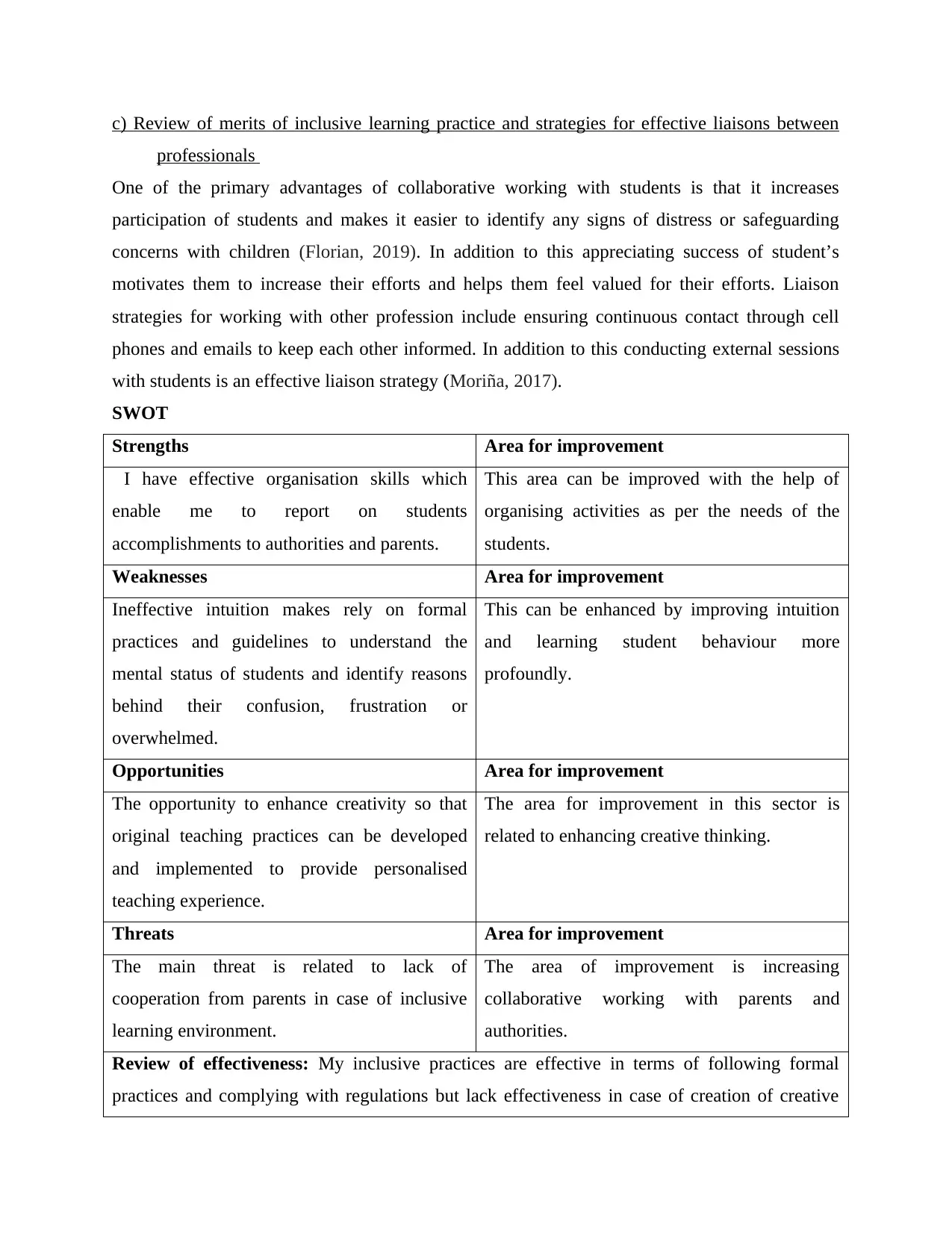
c) Review of merits of inclusive learning practice and strategies for effective liaisons between
professionals
One of the primary advantages of collaborative working with students is that it increases
participation of students and makes it easier to identify any signs of distress or safeguarding
concerns with children (Florian, 2019). In addition to this appreciating success of student’s
motivates them to increase their efforts and helps them feel valued for their efforts. Liaison
strategies for working with other profession include ensuring continuous contact through cell
phones and emails to keep each other informed. In addition to this conducting external sessions
with students is an effective liaison strategy (Moriña, 2017).
SWOT
Strengths Area for improvement
I have effective organisation skills which
enable me to report on students
accomplishments to authorities and parents.
This area can be improved with the help of
organising activities as per the needs of the
students.
Weaknesses Area for improvement
Ineffective intuition makes rely on formal
practices and guidelines to understand the
mental status of students and identify reasons
behind their confusion, frustration or
overwhelmed.
This can be enhanced by improving intuition
and learning student behaviour more
profoundly.
Opportunities Area for improvement
The opportunity to enhance creativity so that
original teaching practices can be developed
and implemented to provide personalised
teaching experience.
The area for improvement in this sector is
related to enhancing creative thinking.
Threats Area for improvement
The main threat is related to lack of
cooperation from parents in case of inclusive
learning environment.
The area of improvement is increasing
collaborative working with parents and
authorities.
Review of effectiveness: My inclusive practices are effective in terms of following formal
practices and complying with regulations but lack effectiveness in case of creation of creative
professionals
One of the primary advantages of collaborative working with students is that it increases
participation of students and makes it easier to identify any signs of distress or safeguarding
concerns with children (Florian, 2019). In addition to this appreciating success of student’s
motivates them to increase their efforts and helps them feel valued for their efforts. Liaison
strategies for working with other profession include ensuring continuous contact through cell
phones and emails to keep each other informed. In addition to this conducting external sessions
with students is an effective liaison strategy (Moriña, 2017).
SWOT
Strengths Area for improvement
I have effective organisation skills which
enable me to report on students
accomplishments to authorities and parents.
This area can be improved with the help of
organising activities as per the needs of the
students.
Weaknesses Area for improvement
Ineffective intuition makes rely on formal
practices and guidelines to understand the
mental status of students and identify reasons
behind their confusion, frustration or
overwhelmed.
This can be enhanced by improving intuition
and learning student behaviour more
profoundly.
Opportunities Area for improvement
The opportunity to enhance creativity so that
original teaching practices can be developed
and implemented to provide personalised
teaching experience.
The area for improvement in this sector is
related to enhancing creative thinking.
Threats Area for improvement
The main threat is related to lack of
cooperation from parents in case of inclusive
learning environment.
The area of improvement is increasing
collaborative working with parents and
authorities.
Review of effectiveness: My inclusive practices are effective in terms of following formal
practices and complying with regulations but lack effectiveness in case of creation of creative
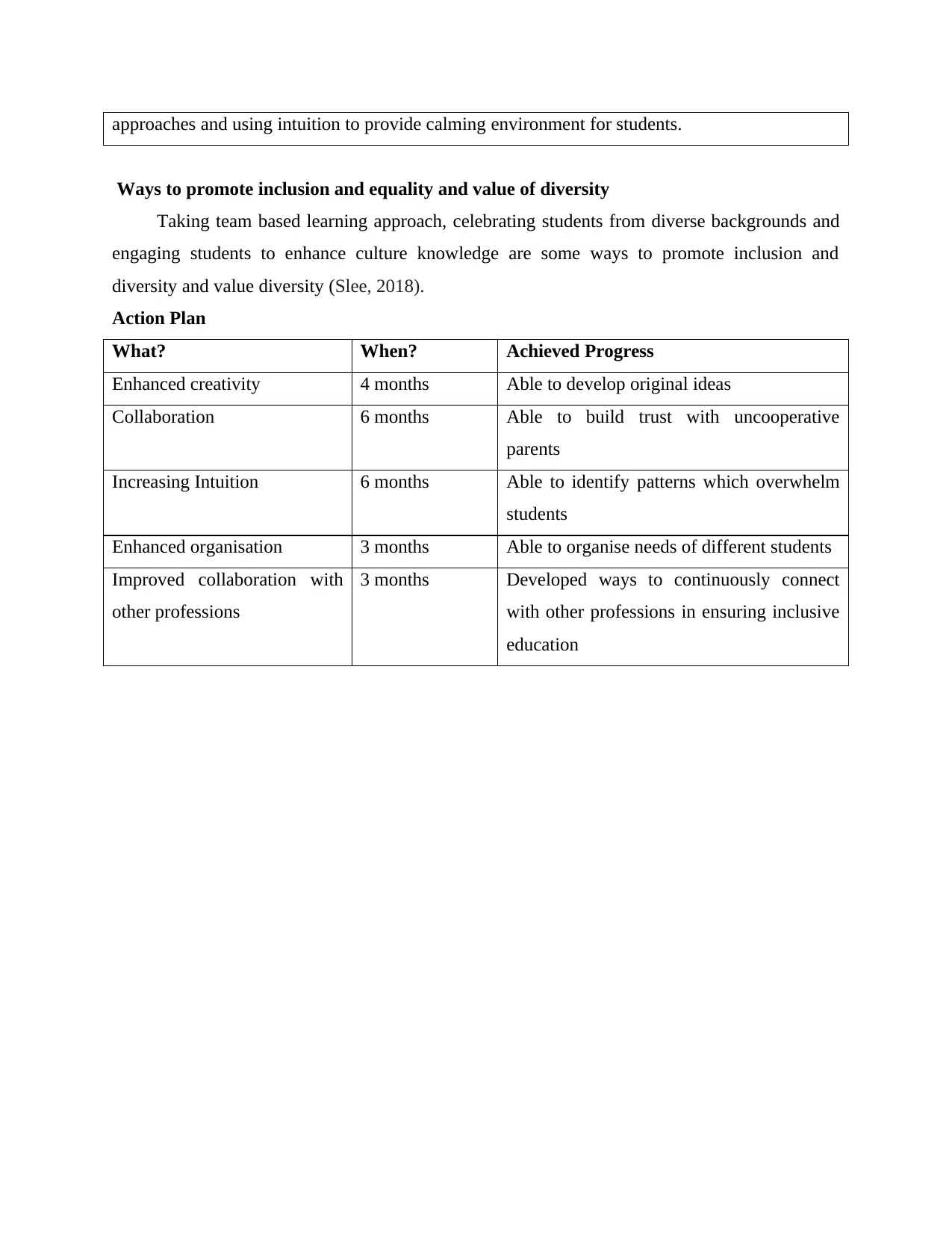
approaches and using intuition to provide calming environment for students.
Ways to promote inclusion and equality and value of diversity
Taking team based learning approach, celebrating students from diverse backgrounds and
engaging students to enhance culture knowledge are some ways to promote inclusion and
diversity and value diversity (Slee, 2018).
Action Plan
What? When? Achieved Progress
Enhanced creativity 4 months Able to develop original ideas
Collaboration 6 months Able to build trust with uncooperative
parents
Increasing Intuition 6 months Able to identify patterns which overwhelm
students
Enhanced organisation 3 months Able to organise needs of different students
Improved collaboration with
other professions
3 months Developed ways to continuously connect
with other professions in ensuring inclusive
education
Ways to promote inclusion and equality and value of diversity
Taking team based learning approach, celebrating students from diverse backgrounds and
engaging students to enhance culture knowledge are some ways to promote inclusion and
diversity and value diversity (Slee, 2018).
Action Plan
What? When? Achieved Progress
Enhanced creativity 4 months Able to develop original ideas
Collaboration 6 months Able to build trust with uncooperative
parents
Increasing Intuition 6 months Able to identify patterns which overwhelm
students
Enhanced organisation 3 months Able to organise needs of different students
Improved collaboration with
other professions
3 months Developed ways to continuously connect
with other professions in ensuring inclusive
education
⊘ This is a preview!⊘
Do you want full access?
Subscribe today to unlock all pages.

Trusted by 1+ million students worldwide
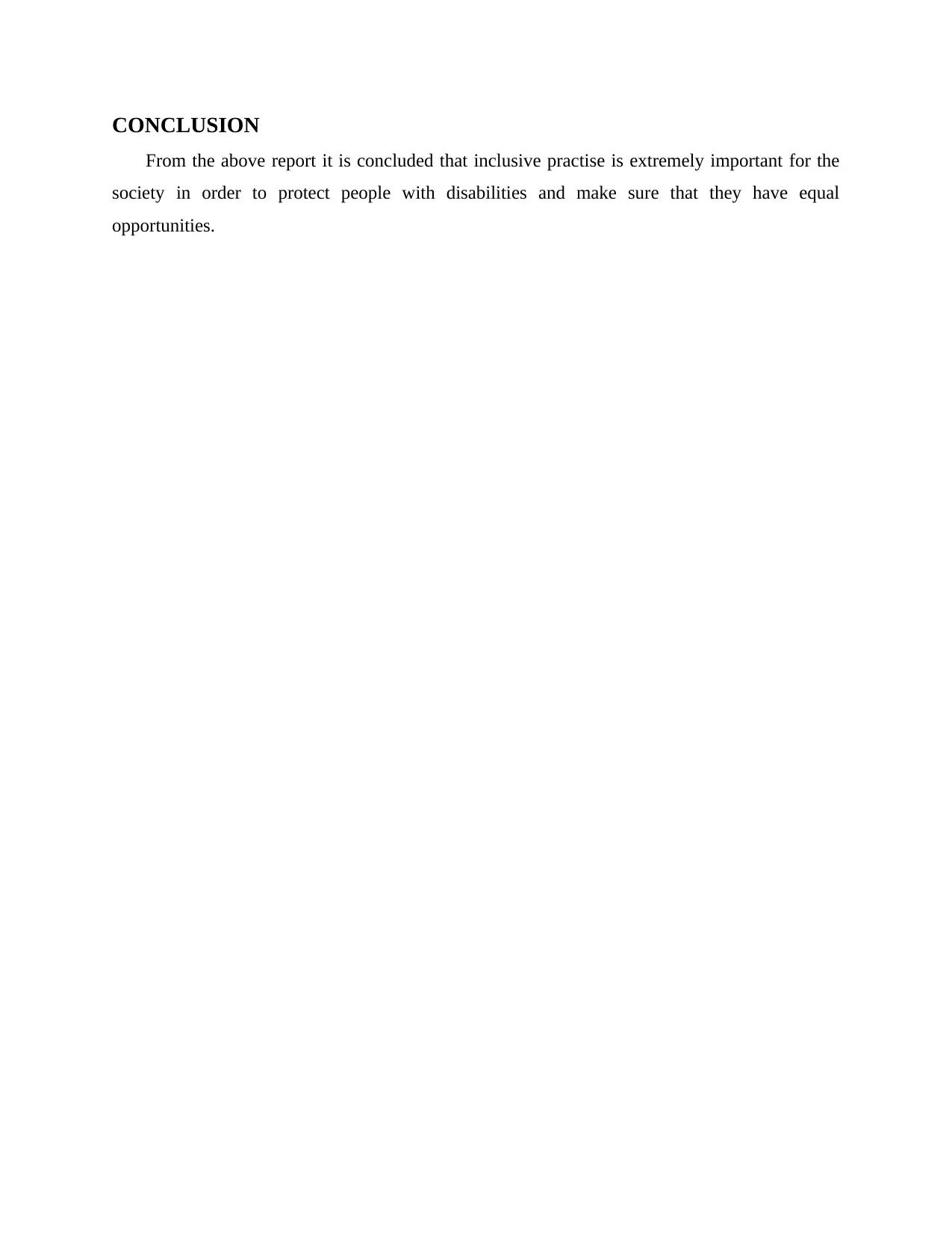
CONCLUSION
From the above report it is concluded that inclusive practise is extremely important for the
society in order to protect people with disabilities and make sure that they have equal
opportunities.
From the above report it is concluded that inclusive practise is extremely important for the
society in order to protect people with disabilities and make sure that they have equal
opportunities.
Paraphrase This Document
Need a fresh take? Get an instant paraphrase of this document with our AI Paraphraser
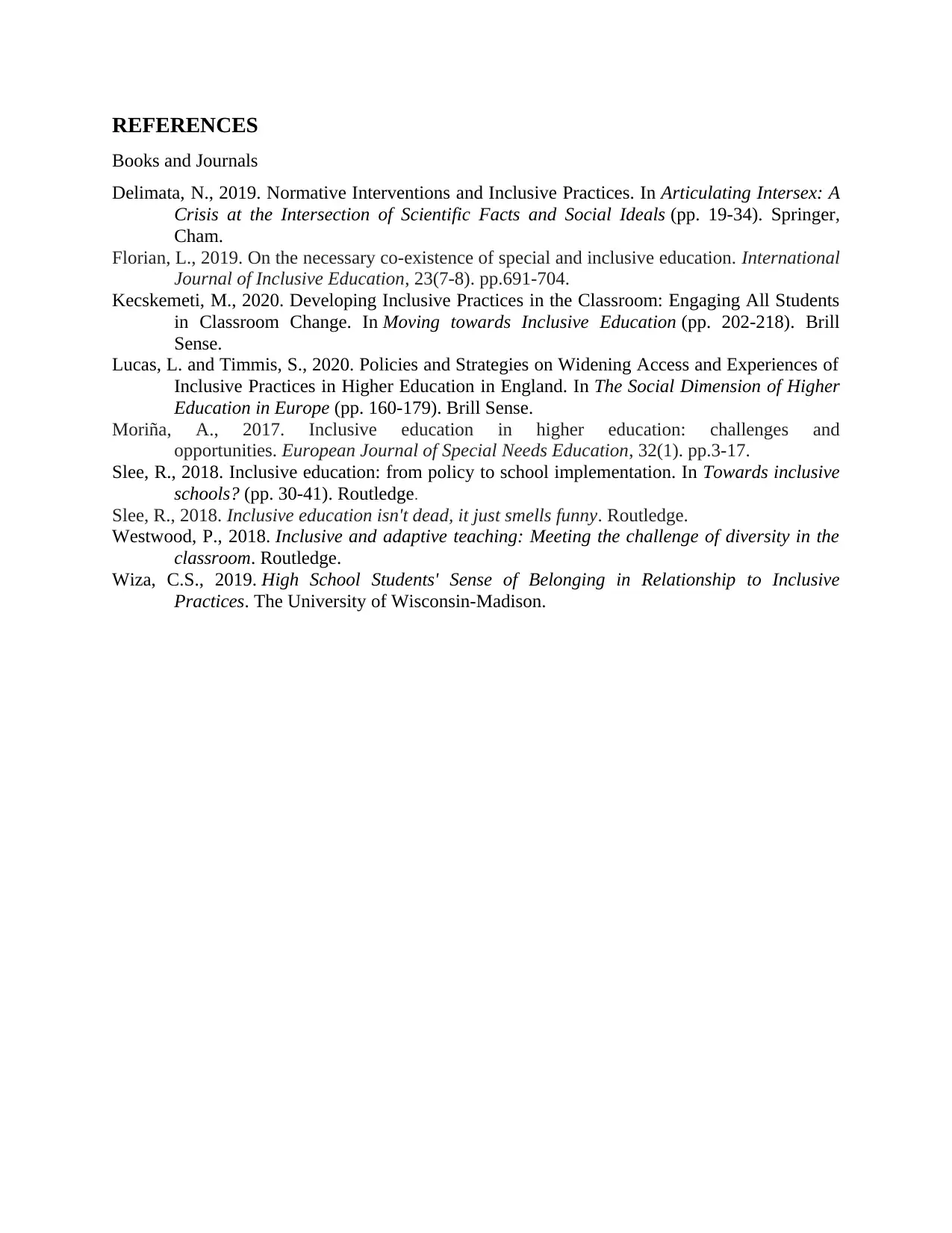
REFERENCES
Books and Journals
Delimata, N., 2019. Normative Interventions and Inclusive Practices. In Articulating Intersex: A
Crisis at the Intersection of Scientific Facts and Social Ideals (pp. 19-34). Springer,
Cham.
Florian, L., 2019. On the necessary co-existence of special and inclusive education. International
Journal of Inclusive Education, 23(7-8). pp.691-704.
Kecskemeti, M., 2020. Developing Inclusive Practices in the Classroom: Engaging All Students
in Classroom Change. In Moving towards Inclusive Education (pp. 202-218). Brill
Sense.
Lucas, L. and Timmis, S., 2020. Policies and Strategies on Widening Access and Experiences of
Inclusive Practices in Higher Education in England. In The Social Dimension of Higher
Education in Europe (pp. 160-179). Brill Sense.
Moriña, A., 2017. Inclusive education in higher education: challenges and
opportunities. European Journal of Special Needs Education, 32(1). pp.3-17.
Slee, R., 2018. Inclusive education: from policy to school implementation. In Towards inclusive
schools? (pp. 30-41). Routledge.
Slee, R., 2018. Inclusive education isn't dead, it just smells funny. Routledge.
Westwood, P., 2018. Inclusive and adaptive teaching: Meeting the challenge of diversity in the
classroom. Routledge.
Wiza, C.S., 2019. High School Students' Sense of Belonging in Relationship to Inclusive
Practices. The University of Wisconsin-Madison.
Books and Journals
Delimata, N., 2019. Normative Interventions and Inclusive Practices. In Articulating Intersex: A
Crisis at the Intersection of Scientific Facts and Social Ideals (pp. 19-34). Springer,
Cham.
Florian, L., 2019. On the necessary co-existence of special and inclusive education. International
Journal of Inclusive Education, 23(7-8). pp.691-704.
Kecskemeti, M., 2020. Developing Inclusive Practices in the Classroom: Engaging All Students
in Classroom Change. In Moving towards Inclusive Education (pp. 202-218). Brill
Sense.
Lucas, L. and Timmis, S., 2020. Policies and Strategies on Widening Access and Experiences of
Inclusive Practices in Higher Education in England. In The Social Dimension of Higher
Education in Europe (pp. 160-179). Brill Sense.
Moriña, A., 2017. Inclusive education in higher education: challenges and
opportunities. European Journal of Special Needs Education, 32(1). pp.3-17.
Slee, R., 2018. Inclusive education: from policy to school implementation. In Towards inclusive
schools? (pp. 30-41). Routledge.
Slee, R., 2018. Inclusive education isn't dead, it just smells funny. Routledge.
Westwood, P., 2018. Inclusive and adaptive teaching: Meeting the challenge of diversity in the
classroom. Routledge.
Wiza, C.S., 2019. High School Students' Sense of Belonging in Relationship to Inclusive
Practices. The University of Wisconsin-Madison.

⊘ This is a preview!⊘
Do you want full access?
Subscribe today to unlock all pages.

Trusted by 1+ million students worldwide
1 out of 9
Related Documents
Your All-in-One AI-Powered Toolkit for Academic Success.
+13062052269
info@desklib.com
Available 24*7 on WhatsApp / Email
![[object Object]](/_next/static/media/star-bottom.7253800d.svg)
Unlock your academic potential
Copyright © 2020–2026 A2Z Services. All Rights Reserved. Developed and managed by ZUCOL.




